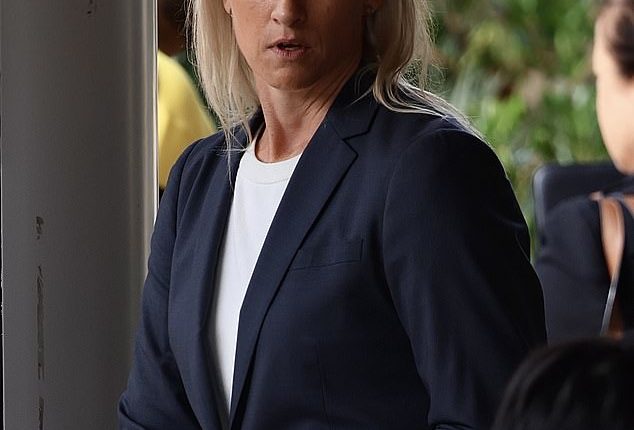The policewoman who shot dead schizophrenic knifeman Joel Cauchi to end the Westfield Bondi Junction massacre believed she would not get out of the shopping centre alive.
‘I actually felt nauseous as I ran in, because in my head, I’d resigned myself to the fact I was probably going to die,’ Inspector Amy Scott told an inquest into the tragedy.
Inspector Scott said she had been trained to accept there was a 60-70 per cent chance a cop would not survive such a situation, even if they were with a partner and wearing a protective vest.
‘And I was neither of those,’ she said.
She broke down as she described the bravery of her fellow officers that day.
Inspector Scott said she believed the public thought police did not feel fear – but some of the young cops who attended the scene that day never returned to work.
‘I just want to acknowledge their courage and bravery,’ she told the inquest.
‘Contrary to how well people feel we are trained, we still feel fear,’ she said through tears.

NSW Police Inspector Amy Scott (pictured arriving at the coroner’s court on Monday) shot dead Joel Cauchi after he had killed five women and one man

Those killed were shoppers Yixuan Cheng, 27, Ashlee Good, 38, Pakria Darchia, 55, Jade Young, 47, Dawn Singleton, 25, and security guard Faraz Tahir, 30
‘That day, as tragic as it was, it gave me faith in humanity. It restored my faith in humanity and the goodness of people.’
The hero cop was giving evidence on the second day of the inquest into the deaths of five women and one man slain by Cauchi.
Inspector Scott fired three shots at 40-year-old Cauchi just one minute and 25 seconds after she entered Westfield Bondi Junction on April 13 last year.
She was the duty officer for Eastern Suburbs area command on the day of the massacre and was on her own in a car when she heard a radio alert at 3.35pm.
‘There was what we call a double beeper,’ she said, describing a call for an urgent response.
The call continued: ‘Eastern Suburbs car in the vicinity, we’re getting multiple calls, multiple stabbings at Bondi Junction Westfield.’
‘I knew then it was very real,’ Inspector Scott said.
Those killed were shoppers Dawn Singleton, 25, Jade Young, 47, Yixuan Cheng, 27, Ashlee Good, 38, Pakria Darchia, 55 and security guard Faraz Tahir, 30.
The inquest will examine the wounding of ten others and the death of Cauchi as well as what might be done to prevent any such future mass fatal attacks.
After hearing the radio call, Inspector Scott drove straight to the shopping centre and pulled up at the corner of Oxford and Adelaide Streets at 3.37pm.
‘As I got out of the vehicle, there were people saying, “There’s a guy in there with a knife, he’s stabbing people, he’s killing people. Please get in there”,’ she said.
Two of those people were French construction workers Damien Guerot and Silas Desperaux.

Two of those people were French construction workers Silas Desperaux and Damien Guerot (pictured left and right)

Inspector Amy Scott is pictured with NSW Police Commission Karen Webb at Westfield Bondi Junction on the first anniversary of the attack
Inspector Scott entered the maze-like complex’s level four with Mr Guerot and Mr Desperaux following her.
‘At the time I was being directed by Damien and Silas to the escalators off to the right near Zara,’ she said.
‘They said that they saw a guy with a knife go up the escalators. It was in the back of my mind that there might be more than one person.
‘I considered it to be an active armed offender. I also knew that I couldn’t wait any more for my colleagues to arrive and I just had to go in.
‘It was my intention to try to find the threat.’
As Inspector Scott proceeded up the escalators, she unclipped her holster but did not draw her Glock pistol. She was followed by Mr Guerot and Mr Desperaux who said: ‘You’re on your own – we’re following you.’
When Inspector Scott spotted Cauchi for the first time and saw him carrying a knife, she yelled at him to stop. He turned and ran.
‘Knowing the size of it and the thickness of it, I knew it could cause some serious damage,’ she said of the weapon.
‘I thought as long as I’m chasing this guy, hopefully he’s not going to do any damage.’
As Inspector Scott got closer, she saw a woman with a pram hiding behind a pot plant on the other side of Cauchi. She motioned for that woman to run.
‘At that point, I yelled out, “Mate”, to get his attention back to me,’ she said of Cauchi.
‘He was kind of rocking and he sprinted downhill at me with the knife.’
Cauchi was about 6m from Inspector Scott when she fired the first of three shots at him, 44 seconds after 3.38pm.

The officer in charge of the investigation, Detective Chief Inspector Andrew Marks, said on Monday he was ‘in awe’ of how Inspector Scott responded to the attack

A member of the public lays flowers at a memorial outside Westfield Bondi Junction three days after the stabbing massacre
Asked her thoughts at that moment, she said: ‘That he was going to kill me.’
‘It was a peculiar thing,’ Inspector Scott said. ‘It’s very fast but in my mind it was extremely slow.
‘I knew my first shot had hit him. That was because of the jolt of his body but he continued to come towards me.
‘I simultaneously was saying, “Stop, drop it “and fired two further shots because I had not been able to stop him with the first shot.’
Inspector Scott approached Cauchi and found the knife under his body. She began rendering first aid but could not save his life.
‘It felt like a year but it was maybe five minutes that I was with Joel,’ she said.
Inspector Scott said she had been trained to deal with an active armed offender during a four-day course in 2016.
Police by then had shifted away from a policy of ‘contain and negotiate’ such an offender to one of confronting them.
‘It’s “don’t wait, go”,’ Inspector Scott said. ‘Stop the killing, stop the dying.’
The coronial inquiry began at the State Coroners Court at Lidcombe in Sydney’s west on Monday and is set to run for five weeks.
State Coroner Teresa O’Sullivan is presiding over the inquest into the killings, which Cauchi committed with a US Marines-style Ka-Bar utility knife he bought on February 24 last year.

Joel Cauchi was diagnosed with schizophrenia around the age of 18 and for the next 18 years generally complied with taking medication
The families of the deceased are all legally represented, as are bodies including shopping centre management and both NSW and Queensland police.
Dr Dwyer said on Monday evidence would be ‘clear and unanimous’ that Cauchi was ‘floridly psychotic’ on the day of the stabbings.
Cauchi’s mental health history looms large over the inquiry and there has already been evidence he eventually ‘fell through the cracks’ in his treatment.
Dr Dwyer has stressed the purpose of the inquest is not to apportion blame for what happened but to examine whether there were lessons to be learned from the tragedy.
No graphic CCTV footage of the attack would be played in court and no such vision is part of the 50-volume brief of evidence.
Dr Dwyer has said expert opinion given to the court would be ‘clear and unanimous’ that Cauchi was ‘floridly psychotic’ on the day of the stabbings.
He had first been diagnosed as schizophrenic as a teenager and he had been treated successfully for many years.
Cauchi’s parents had been able to keep him on a treatment program until he was 36 but while living homeless in Sydney he had been completely unsupervised.
Among the issues to be canvassed will be Cauchi’s previous treatment and the circumstances of him ceasing the use of psychotropic medication in 2019.
The coroner will look at the preparedness of Westfield Bondi Junction to deal with an active armed offender and the response of security staff and emergency services.
She will also consider whether there should be restrictions on weapons such as the Ka-Bar knife Cauchi used to kill his victims.
Expert testimony will be heard comparing what happened at Westfield Bondi Junction with the Manchester Arena bombing of 2017 and the mass shootings in Christchurch in 2019.
Dr Dwyer has said there will be no direct evidence of any motive for Cauchi’s actions but he may have made some ‘rudimentary plans’ for the killings.
His internet browsing showed he was obsessed with serial killers and on the morning of rampage he had conducted searches for the Columbine High School massacre.

Joel Cauchi’s mental health history looms large over the inquiry and there has already been evidence he eventually ‘fell through the cracks’ in his treatment
Cauchi grew up in Toowoomba and had a relatively normal childhood but began experiencing symptoms including hallucinations and delusions when he was 14.
He was diagnosed with schizophrenia around the age of 18 and for the next 18 years generally complied with taking medication as part of a treatment plan.
Cauchi was treated within the Queensland public health system from 2001 to 2012, when he began seeing a private psychiatrist. His medication was gradually reduced and finally ceased in June 2019.
His parents Andrew and Michele were worried their son was not receiving treatment and his mother raised concerns from late 2019 he was hearing voices again.
Cauchi moved to Brisbane in early 2020 and from about that time until the Westfield Bondi Junction stabbings his schizophrenia remained completely unmanaged.
He had eight ‘interactions’ with Queensland police for public transport fare evasion, traffic stops and ‘street interceptions between August 2020 and September 2023.
In January 2023 police attended Cauchi’s parents’ home after his father confiscated a collection of knives the troubled drifter had assembled.
His parents told police their son was mentally unwell and needed treatment – he had been hallucinating – but no further action was taken.
At the time of the shopping centre attack, Cauchi had been living rough around Maroubra in Sydney’s eastern suburbs.
On the morning of April 13, 2024 he went to a Kennards storage unit at Waterloo in the inner-city and retrieved a backpack containing the Ka-Bar knife.
For the next four hours Cauchi used public transport to move between the city and eastern suburbs before entering Westfield Bondi Junction shortly after 3pm.
In less than three minutes he stabbed 16 people, killing six and injuring 10 others, before he was shot dead by Inspector Scott.
Of Inspector Scott’s response that day, Dr Dwyer said: ‘There is no question as to the propriety of her actions.’
Dr Dwyer praised Inspector Scott’s ‘professionalism and courage’ and said she had clearly saved lives.
She also noted the ‘hope, courage and selflessness’ of civilians who witnessed the carnage and moved quickly to help others.
‘There were so many people who were called on to do something exceptional that day who rose to the task,’ she said.
The officer in charge of the investigation, Detective Chief Inspector Andrew Marks, said on Monday he was ‘in awe’ of how Inspector Scott handled the circumstances.







